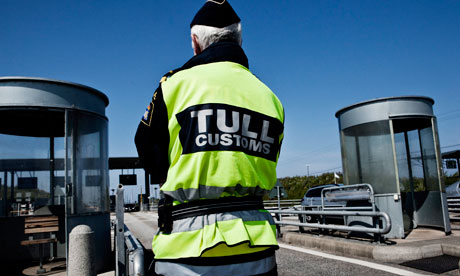Results 1 to 1 of 1
Thread Information
Users Browsing this Thread
There are currently 1 users browsing this thread. (0 members and 1 guests)
-
09-08-2011, 03:32 AM #1Senior Member


- Join Date
- May 2007
- Location
- South West Florida (Behind friendly lines but still in Occupied Territory)
- Posts
- 117,696
EU To Stop Countries Bringing Back Border Controls
EU executive to stop countries bringing back border controls
Countries in the Schengen agreement would not be allowed to limit freedom of movement without approval under the plans
Ian Traynor in Brussels guardian.co.uk
Tuesday 6 September 2011 17.09 BST

A border point between Copenhagen in Denmark and Malmö in Sweden. Denmark reintroduced controls on its frontiers with Germany and Sweden earlier this year. Photograph: Morten Germund/EPA
The EU executive is to unveil legislation denying national governments the power to curb freedom of movement across Europe's passport-free travel zone.
The European commission proposals will put Brussels on a collision course with France, Italy, Germany and other EU countries that jealously guard their authority over national borders and are pushing for greater leeway to limit Europe's no-borders regime.
The free travel regime known as the Schengen system â embracing 22 EU countries as well as Switzerland, Norway and Iceland â was called into question earlier this year when the Italian and French leaders, Silvio Berlusconi and Nicolas Sarkozy, feuded over a small influx of immigrants from Tunisia. http://www.guardian.co.uk/world/2011/ma ... intcmp=239
France reintroduced border controls to stop the immigrants arriving from Italy. Denmark then unilaterally decided to re-erect border and customs checks on its borders with Germany and Sweden.
Under the reformed law being proposed by Cecilia Malmström, the commissioner for home affairs, Italy, France and Denmark would be unable to act without approval from the commission.
"The problem today is not that there is too much Europe, but too little Europe. We need to avoid Schengen being used as a tool by the EU member states," a senior EU official told the Guardian. "Schengen is a fantastic achievement. But the shortcomings must be fixed. The solution is to Europeanise it."
Malmström's spokesman, Michele Cercone, said on Tuesday that Schengen "is one of the most important achievements and the commission is determined to defend it. At the moment an area of common interest is governed by individual decisions. This has to be changed."
Under Malmström's proposals, to be unveiled within a fortnight, the commission in Brussels would have the last word and an effective veto over the decisions of EU national governments. The draft law would also give the European parliament more of a say in how Schengen operates.
Seen as one of the EU's signature achievements, Schengen enables some 400 million Europeans to travel without passports from the Turkish border to the Arctic circle and from Portugal to Russia's frontier.
Participating countries are allowed to reintroduce border controls briefly on national security grounds, such as when hosting major international summits or sports events.
Border controls have been re-erected 26 times in the past five years, most recently when Norway closed its border with Sweden for 18 hours following the Breivik massacre in July.
Under the proposed reforms, the commission as well as a majority of other EU governments would decide when one country could re-introduce border controls.
The proposal splits the criteria for restored border checks into "foreseeable" and "unforeseeable" events.
With foreseeable events, say hosting the Olympics or World Cup, the commission, backed by a qualified majority of Schengen states, would allow a country to reintroduce border controls for between one and six months.
In the unforeseeable scenario, for example a major terrorist attack or an epidemic, a country could act unilaterally to re-erect border controls, but only for five days. After that it would need the permission of the commission and the EU-qualified majority.
"This needs to be a community decision," said the senior official. "The member states can't do this on their own. Schengen is about facilitating freedom of movement, not being a political toy for governments."
The proposals are likely to enjoy support in the European parliament and among many EU governments who were alarmed at the attempts by France, Germany, Italy, Denmark and the Netherlands to restrict passport-free travel, seen by many as one of the EU's signature achievements.
But the commission's move is certain to encounter stiff opposition in Paris, Berlin and Rome, with France and Germany in particular increasingly eager to bypass Brussels in the running of the EU and marginalise the European commission.
http://www.guardian.co.uk/world/2011/se ... r-controlsJoin our efforts to Secure America's Borders and End Illegal Immigration by Joining ALIPAC's E-Mail Alerts network (CLICK HERE)


 LinkBack URL
LinkBack URL About LinkBacks
About LinkBacks




 Reply With Quote
Reply With Quote

San Diego to Receive Additional $39 Million for Illegal...
04-16-2024, 06:43 AM in illegal immigration News Stories & Reports